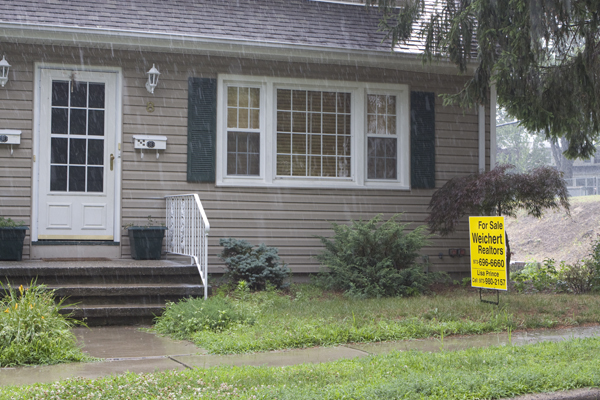Adapt or Die
While Risks Rise – Christie Cuts Funds and Rolls Back Regulatory Protections
[Updates below]
The University of New Hampshire (UNH) just issued an important and amazingly timely Report: Trends in Extreme Precipitation Events for the Northeastern United States 1948-2007. (h/t to “Enviroguy” Todd Bates’ blog, Asbury Park Press). The UNH Report was covered in a national AP story in today’s Bergen Record:
BOSTON – ” The Northeast is seeing more frequent “extreme precipitation events” in line with global warming predictions, a study shows, including storms like the recent fierce rains whose floodwaters swallowed neighborhoods and businesses across New England.
The study’s results are consistent with what could be expected in a world warmed by greenhouse gases, said UNH associate professor Cameron Wake. He acknowledged it would take more sophisticated studies to cement a warming link, though.
“I can’t point to these recent storms and say, that is global warming,” he said.
What is more certain, researchers said, is the potential economic impact should the 60-year trend continue and require billions of dollars in infrastructure improvements to things in the region including roads, bridges, sewers and culverts.
Todd’s blog post and the Bergen Record fail to localize the UNH Report and apply its findings to NJ’s recent severe coastal storm damage and inland flooding.
So, let me take a very brief shot here – and by doing so, perhaps challenge NJ’s media and policy makers to engage a more thorough analysis and response. But first, the press just needs to ask simple questions:
Why is no one analyzing the same rainfall and flooding data and correlating it with land use changes here in NJ? (hint: it’s not due any to lack of hydrology data or land use/land cover data or precipitation data)
Why is the relationship between global warming and increased storm frequency/intensity/pattern rarely if ever made by the same tired meteorologists quoted in the NJ news stories?
The UNH Report makes two very obvious and fundamental findings we have been repeating for many years (e.g. see this and this and this and this and this and this and this and this, especially the Ocean County soil compaction analysis). We have the same phenomena right here in NJ. Yet, both UNH findings are ignored completely in NJ’s media coverage of flooding and global warming issues, as well as in NJ’s policy and regulatory responses:
1) global warming is causing increasingly severe and frequent storm events, which are directly related to increased precipitation and flooding events:
Flooding events are relatively rare but naturally occurring in the Northeastern United States. For example, New Hampshire has averaged about one major, destructive flood per decade since the early 20th century. A major concern is that New Hampshire has recently experienced three major flooding events that followed three major extreme precipitation events (October, 2005, May, 2006, and April, 2007)2 (Table 1). As this report goes to press, major, but as yet unquantified, multiple flooding events are taking place here in March, 2010.
Decision makers currently use outdated flood-risk information and floodplain maps, based on historic rainfall and peak-discharge data that do not represent recent historical or current rainfall patterns.3 To facilitate effective planning, decision makers also require information on the future implications of changing land use and climate at a local scale, where climate change impacts are felt and understood most clearly.4 This study aims to provide a quantitative understanding of the current trends in extreme precipitation for the Northeast so that resource managers, municipal, county, state, and federal representatives, and other stakeholders have a baseline of information from which to prepare for and adapt to future climate change.
2) land use changes – i.e. development – are making the problem far worse
The growth in flood damage is partially due to an increase in impermeable surfaces in our watersheds, combined with more building in flood-prone areas. New England has experienced considerable development in many of its watersheds, with the consequent increase in impermeable surfaces such as asphalt resulting in more rapid runoff. Flooding is therefore more predominate, even with the same amount of rainfall.
The NJ Department of Environmental Protection is well aware of these serious issues and has been issuing warnings for years. For example, here are NJDEP’s Coastal Assessment and Strategy Report findings: (discussed in Letter on Catastrophic Storm Risk legislation (A3236))
“While the precise rate of sea level rise is uncertain, current models indicate that global warming will cause the rate to increase. Recent projections forecast that relative sea level rise at the New Jersey coast will be between 0.31 m and 1.10 m by 2100. The approximate central value of this range, 0.71 m is more than twice the rise that occurred during the last century. This increase would result in the threat of more sustained extreme storm surges, increased coastal erosion, escalating inundation of coastal wetlands and saline intrusion.
Many parts of New Jersey’s densely populated coastal area are highly susceptible to the effects of the following coastal hazards: flooding, storm surge, episodic erosion, chronic erosion, sea level rise, and extra-tropical storms. Reconstruction of residential development and the conversion of single family dwellings into multi-unit dwellings continues in hazardous areas; the value of property at risk is increasing significantly. With anticipated accelerating sea level rise and increasing storm frequency and intensity, vulnerability to the risks of coastal hazards will not abate; it will only become more costly.
In certain instances, structural engineering solutions will not be practical or economically feasible. In these cases future public and private development and redevelopment must be directed away from the hazardous areas. While some derogatorily refer to this option as “retreat,” from the perspective of sound planning based on the best available science, the concept actually involves “strategic adjustment.” Prudent planning requires that we expand upon the existing studies of the societal, economic, and environmental costs of possible mitigative actions while the greatest number of alternatives exist.
These findings led DEP to hold a September 25, 2006 Insurance industry seminar (see this), at a time that the insurance industry was threatening to walk away from the NJ shore due to huge multi-billion loss risks:
TRENTON- As Corzine Administration officials met quietly behind closed doors with insurance and finance industry leaders to discuss a statewide insurance fund to finance catastrophic shore storm risks, environmentalists called on the Governor to incorporate much needed coastal development and global warming policy reforms in any industry bailout package.
Numerous scientific studies and NJDEP Reports show that the over-developed NJ shore is increasingly vulnerable to hurricane and storm related wind, storm surge, and flooding damage. Those risks are magnified by the effects of global warming induced sea level rise. NJ already is among the worst states in the nation for payouts on repeat claims under the federal flood insurance program. While risks are great and growing, DEP’s own studies show that public awareness is low, and local and state disaster planning and emergency response capabilities are woefully inadequate.
Despite these significant risks, continued over-development, particularly in known high hazard areas along the shore, puts more people and property in harms way, greatly increasing not only risks to life and property. The probability is increasing for a catastrophic coastal storm event that would cause huge economic dislocation.
The multi-billion dollar scope of the problem and potential insurance liability has led insurance industry leaders to withdrawn from insurance markets in the tri-state region, and to seek a public bailout of insured liability.
In response to this industry concern, Corzine Administration officials in the Departments of Insurance and Environmental Protection have been meeting to negotiate a policy initiative. There is rumored to be a meeting with industry leaders today.
Coastal vulnerability and increased flooding risks were a significant justification for NJ’s Global Warming Response Act. DEP recently issued the Final Report mandated by the GWRA. Adaptation strategy recommendations are found in Chapter 4 of DEP’s December 24, 2009 Global Warming Response Act Recommendations Report. DEP calls for the development of a comprehensive adaptation plan:
Despite our best efforts to mitigate climate change in New Jersey, the State must develop a comprehensive plan to adapt to current and future changes in climate. CO2 and other GHGs are known to remain in the atmosphere for decades, and even up to centuries, from the time they are emitted into the atmosphere.99 Even if all emissions were stopped immediately, there would be a lag between mitigation of emissions and cessation of warming. Thus, New Jersey is expected to face many public health, ecological and economic impacts with specific consequences noted by the Northeast Climate Impacts Assessment.
Predictions are that in coming years, sustained higher temperatures during the summer months will make our citizens especially vulnerable to heat-related illness. Warmer temperatures and increases in short-term droughts are expected to have impacts on agriculture and water supply availability. Warmer temperatures will lead to more intense rain events which, coupled with rising seas, will leave our coastal and riparian areas especially vulnerable to flooding, with additional repercussions for water supply. Sea level rise will impact coastal communities and coastal habitats. Non-climate stresses, such as dense population, high impervious cover, high nutrient loading, and high flooding potential, or a combination of these factors, will exacerbate vulnerability to climate change.101 These are just some examples of the long-term impacts we expect concurrent with our efforts to mitigate GHG emissions.
Thus, a comprehensive adaptation policy must be developed as a key component of any long term climate change action plan. Addressing these issues today just makes sense; they are complicated and require thoughtful approaches. It is hard to predict precisely which of the losses to New Jersey might be irreversible, yet, we must acknowledge that some may be permanent. Still, we cannot, as some say, “wait it out.†While climate change might cause irreparable losses in some areas, it may also create economic opportunities in others. For example, spending to construct and/or adapt buildings and homes for storm resilience may be a good investment for property owners in terms of personal safety and financial exposure, while providing a positive outcome for communities in terms of reduced emergency services and preservation of a neighborhood. Similarly, water conservation measures for protection against more intense droughts in the long-term can certainly result in benefits for mitigation of droughts in the shortterm.
Yet, the Christie Administration, to save a few hundred thousand dollars, is seeking to eliminate the DEP’s Office of Climate Change, which is the Office that is developing this important programs and planning effort.
So, as I said, I tried to briefly sketch the scope of the NJ issues raised by the UNH Report.
Let’s hope these issues get more attention by media and policymakers. There is plenty of information provided above.
Then, perhaps the severely negative implications of the Christie de-funding and regulatory rollback efforts are more widely understood so that they can be stopped and reversed.
Other contributors to the UNH Report: Carbon solutions New England and Clean Air – Cool Planet
[Update: Twelve years after I wrote this, check out his essay:
There is also the possibility that the human species goes the other way and adapts. Organisms always wind up hitting a juncture where they either adapt to a new situation or go extinct, and we are approaching our juncture now. […]
Once we move out of our narrative manipulation-driven model of competition and domination, and into a lucidity-driven model of collaboration with each other and with our ecosystem, a lasting peace will open up to us all. ~~~ Caitlin Johnstone
[Update: more evidence: “NJ Under Brushfire Watch” ~~~ end update]
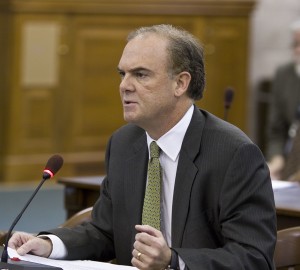
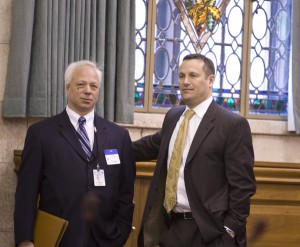


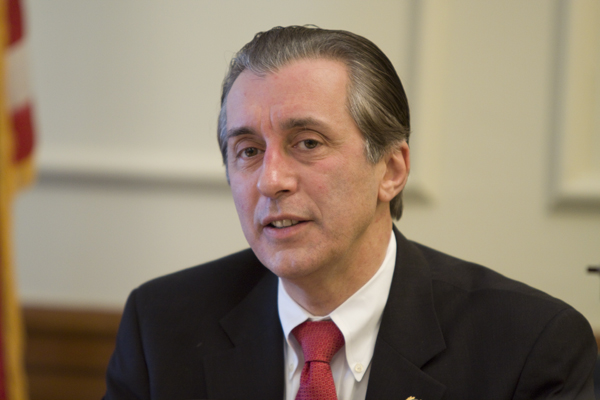
 :1B-2. Commissioner of Conservation and Economic Development; appointment; term; salary
:1B-2. Commissioner of Conservation and Economic Development; appointment; term; salary 12.
12.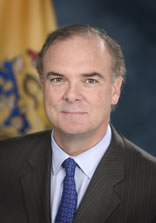 Demonstrating his commitment to building a strong, experienced team, Governor Chris Christie nominated Bob Martin to serve as Commissioner of the Department of Environmental Protection.
Demonstrating his commitment to building a strong, experienced team, Governor Chris Christie nominated Bob Martin to serve as Commissioner of the Department of Environmental Protection.